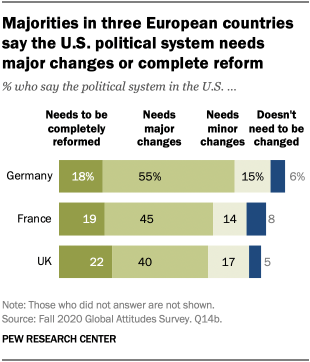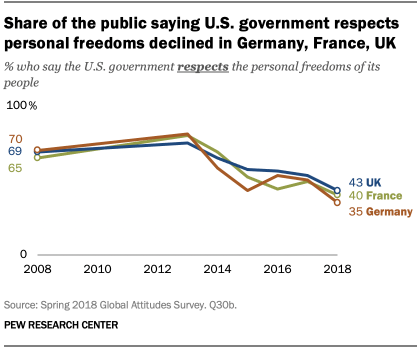
The violent storming of the U.S. Capitol on Jan. 6 by a mob of supporters of President Donald Trump has generated considerable attention overseas, as well as concerns about the health of American democracy. Even before the riot, however, many people in three key allies of the United States – Germany, France and the United Kingdom – were worried about the American political system.
Large majorities in all three countries said in a fall 2020 Pew Research Center survey that the U.S. system needs either major changes or to be completely reformed. The view was especially common in Germany, where 55% said major changes are necessary and an additional 18% said the system should be completely reformed. The share of people who said major changes to the U.S. system are necessary was slightly lower in France (45%) and the UK (40%).
Few people in the three nations said no changes to the U.S. system are needed.
This analysis covers how those in Germany, France and the UK see the U.S. political system following the 2020 election. It includes demographic analysis comparing responses to the questions by views about political parties. The post also draws on long-term trend data to contextualize these views.
For this post, we use data from nationally representative telephone surveys of 3,066 adults from Nov. 12 to Dec. 23, 2020, in France, Germany and the UK. We also use a Körber-Stiftung survey conducted by Kantar in Germany from Nov. 6-10 among 1,058 respondents.
Here are the questions used for this report, along with responses, and its methodology.
In the UK and Germany, attitudes toward right-wing populist political parties played a role on this question. Those with a favorable view of the UK’s Brexit Party (now called the Reform Party) and Germany’s Alternative for Germany (AfD) were less likely than people with negative views of those parties to say the U.S. system needs to be completely reformed.
A separate survey conducted in Germany by Körber-Stiftung days after the 2020 election found declining confidence in U.S. democracy. When asked if the election strengthened or weakened their trust in U.S. democracy, 53% of Germans said it weakened their trust. About a third (34%) said it strengthened their trust, and about one-in-ten (7%) said it neither strengthened nor weakened their trust.

While the 2020 election may have raised concerns about the health of the U.S. political system among people in other countries, doubts about certain aspects of American democracy have been growing over the past several years.
In Germany, France and the UK – as well as other nations around the world – the share of people who believe the U.S. government respects the personal freedoms of its people has declined over time. As is true with many aspects of America’s international image, views on this question turned more negative during the Trump years, but the trend began before he took office.
Pew Research Center first recorded a decrease on this measure between 2013 and 2014, as news broke about Edward Snowden and National Security Agency surveillance around the world. Further declines occurred in 2015 following protests in Ferguson, Missouri, in response to the police killing of Michael Brown the year before. The erosion steadily continued through 2018, the last time the question was asked.
Previous international surveys by the Center also asked a question regarding “American ideas about democracy.” In 2017, the last time the question was asked, global publics were mixed in their views of American ideas about democracy. Globally, a median of 46% said they dislike these ideas, while 43% said they like them. Majorities in France (64%) and Germany (56%) said they dislike American ideas about democracy, but the share who said this was lower in the UK (44%).
Note: Here are the questions used for this report, along with responses, its full dataset and its methodology.